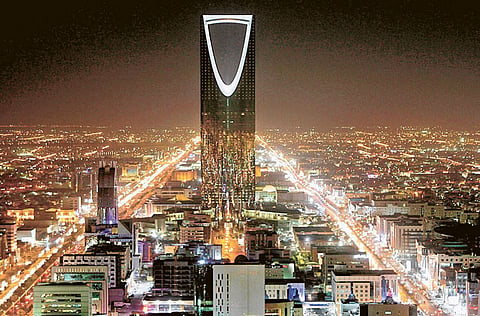Saudi Arabia's budget surplus to decrease in 2012
Estimates are likely to be surpassed if oil prices surge

Dubai: Saudi Arabia, the Arab world's biggest economy and world's top oil producer, will spend 690 billion riyals (Dh675 billion) in 2012 — a 17 per cent decrease in its actual spending this year of 804 billion riyals, the government said yesterday.
Announcing the budget for 2012, the Saudi Finance Ministry said it projected a budget surplus of 12 billion riyals ($3.2 billion) next year, down from 306 billion riyals this year, depending largely on oil revenues. Total revenue next year is projected at 702 billion riyals, it said in a statement on its website.
King Abdullah announced a $130 billion (Dh477 billion) spending plan in the first quarter to build homes and combat unemployment of 10 per cent. In its original budget for 2011, the government envisaged spending of 580 billion riyals.
Infrastructure spend
After uprisings began in the Arab world early this year, Saudi Arabia announced extra spending on infrastructure and welfare which the International Monetary Fund (IMF) estimated at $110 billion over several years.
In the 2012 budget announcement, the Finance Ministry said it had set aside 250 billion riyals from the 2011 budget surplus to fund one of the special projects, the construction of 500,000 homes.
The economy is expected to expand 6.8 per cent in the coming year, the ministry said. It expected inflation of 4.7 per cent in 2011 and public debt to fall to 6.3 per cent of the GDP this year.
Analysts say expenditure, revenue and surplus levels next year will probably surpass the announced amounts as oil prices are expected to surge next year.
"This will lead to more economic activity in Saudi. It is the biggest Arab economy and with the free trade agreements with the GCC, the Gulf countries will benefit from the surplus. There will be more exports from the GCC to Saudi because of higher local demand in Saudi," said Mohammad Al Asoomi, a UAE economic expert.
Increased spending on public services, salaries and investments is expected next year given the budget surplus, he said.
Weaker demand for energy from Europe and the US will not necessarily impact the Saudi economy's growth rate, he said.
"There will be more demand from other spots. Brazil is expected to exceed the UK as the sixth biggest economy in the world and global oil demand is expected to increase next year. If there is less demand from Europe or the US, there will still be demand from China and India," he said.
Saudi Arabia traditionally uses a conservative price for oil of around $60 per barrel in its budget forecast.
Saudi oil minister Ali Al Naimi said earlier this month that Riyadh's current output level was 10.047 million barrels per day (bpd), significantly higher than its quota of 8.05 million bpd.
Sign up for the Daily Briefing
Get the latest news and updates straight to your inbox



